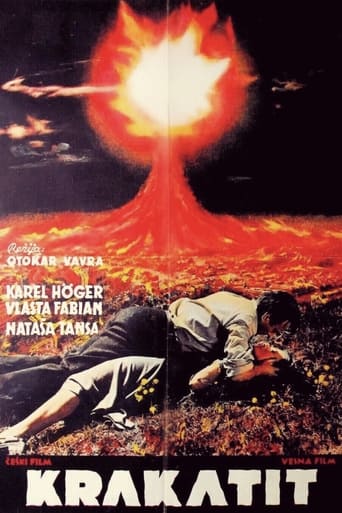morrison-dylan-fan
Talking to a fellow IMDber about the Czech New Wave (CNW) Sci-Fi flick Who Wants To Kill Jessie,I found out about a Czech Sci-Fi Film Noir made decades before the CNW,which led to me deciding that it was time to burn the Krakatit.The plot:Taken to a hospital, Prokop starts to dream about the events which have left his hands badly burnt.Earlier:Staggering down a street,Prokop meets old friend Jiří Tomeš,who takes Prokop back to his home to rest.Entering Tomeš's home,Prokop begins talking about a new powerful explosive he has created called Kraktit.Waking up,Prokop discovers that Tomeš has written the formula down. As he leaves Tomeš's house,Prokop discovers that everyone wants his creation for their own ruthless means.View on the film:Set alight the year The Communist People's Militias group grabbed control of the country in a coup d'état,co-writer/(along with bother Jaroslav) director Otakar Vávra bleeds blistering Sci-Fi,Film Noir paranoia from Karel Capek, (who was the first person to use the word "robot")over a chilling Cold War canvas.Keeping the movie's feet on the ground by avoiding any flamboyant elements in the Sci-Fi machinery,the Vávra's smartly use the new technology to give Prokop a slippery menace,due to the satellite tracking and Prokop's own explosive creation being dangerous machines which everyone is out of their depth in using.Striking a note of hope over the early Cold War tension not heating up,the Vávra's burn any sign of light to the ground. Pinning Prokop down in his bed,the Vávra's unmask a nightmare fever dream,where Prokop find every attempt he makes to keep the Krakatit out of reach to lead him down a rotting Film Noir path covered in sharp tooth Femme Fatale and backstabbing friends after his deadly creation. Clouding Prokop's memories,director Otakar Vávra and cinematographer Václav Hanus soak the Sci-Fi in a wonderful uneasy mood,where ultra- stylised reflecting mirrors and fractured shadows make Prokop doubt the ground he walks on. Striking Jirí Srnka's thunderous score over the credits, Vávra cuts into Prokop's Film Noir paranoia with a ruthless intensity,by crossing tightly coiled tracking shots of Prokop going down burnt-up Film Noir streets with fiery whip-pans that capture the murderous force of Prokop's powder.Getting out of the submarine she was held in for Rene Clement's The Damned from the previous year,the gorgeous Florence Marly gives an incredible performance as Princess Wilhelmina Hagen. Initially looking regal,Marly rips the royal shine up to expose a viper Femme Fatle, who slithers in the shadows to kill every Film Noir loner in her sights. Hit with a torn lip, Karel Höger gives an excellent Film Noir loner performance as Prokop,thanks to Höger displaying Prokop's desperation in making everyone aware of the danger,but being unable to stop the Krakatit from being lit.
Mozjoukine
In the brief window of opportunity between the WW2 expulsion of the Nazis and the Communist take over, the Czech cinema produced films which appear to be superior to those done there before or for decades to come. KRAKATIT is the most remarkable of them we know.It's the work of long time survivor director Vavra and features his regular leading man Hoger and globe trotting leading lady Marly (L'ALIBI, SEALED VERDICT, PLANET OF BLOOD) who has a comparatively small role and it treats a story by Capek, the country's then famous author of "R.U.R" the play that gave the word robot to the world. The original, I'm told, did not contain the A bomb analogy the film uses.Slipping in and out of hallucination Hoger fantasizes about the ultimate explosive. The black and white imagery and the structure are well on the way to being the most imaginative of it's day. The laboratory scene anticipates one famous American film of the sixties in a way unlikely to be a coincidence. The brooding, damp atmosphere the film communicates lingers in the memory of most people who see it.Vavra remained the industry's key figure but failed to match this work which should be more widely circulated.
cbreyno
I saw this film once 46 years ago and it left an indelible impression on me.It brings out a strange and beautiful romanticism from the Capek novel. It delves into the angst that Szilard, Fermi and Oppenheimer might have felt regarding the development of the A-Bomb.It takes you on quite a journey.



